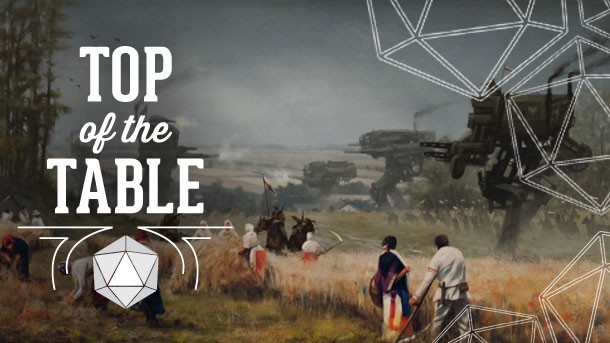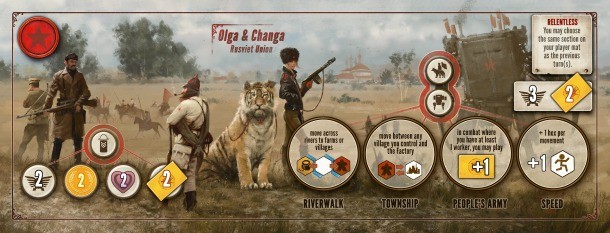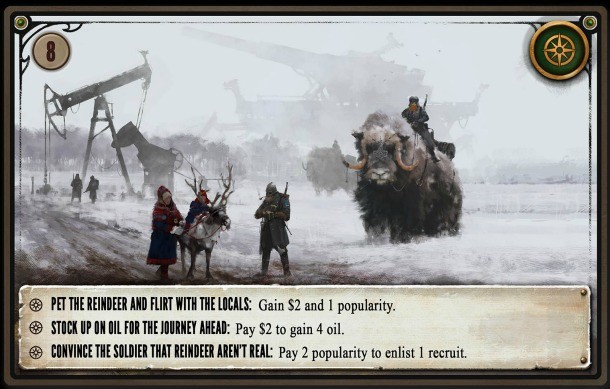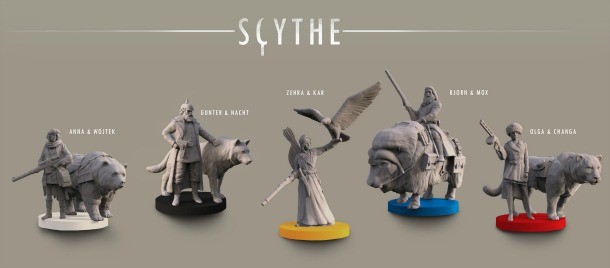Top Of The Table – Scythe

From time to time, my focus in Top of the Table shifts toward accessible titles that can help to introduce tabletop gaming to new players, through titles like Flick 'em Up or Codenames: Pictures. Those games are excellent, but this week's selection is squarely targeted at veteran gamers ready for their next big adventure. Designed by Jamey Stegmaier, Scythe is a sophisticated and inventive strategy board game of area control, resource management and development, and competition, for one to five players. An alternate history post-World War I setting is gorgeously illustrated by Jakub Rozalski, and realized through storytelling nuggets, card art, and overall presentation. However, it's Scythe's streamlined and fast-moving play (without ever simplifying) that earns it a place as one of my favorite new games of the last several years.
Players take on the role of faction leaders in the wake of the Great War in Eastern Europa. In this version of history, a great factory fueled the prior conflict, providing massive armored mechs that wandered the countryside meting out destruction. Now, in the wake of the conflict, your unique faction must claim dominance. It's only after playing Scythe a few times that the asymmetry and intricate balance begins to reveal itself. Whether it's the great swimmers of the Nordic faction, or the stubborn relentlessness of the Rusviets, each faction has unique abilities, starting resources, and hidden goals that help shape their futures. Individual factions start play from specific areas on the board, which all lend themselves to capitalizing on your individual strengths – if you can recognize the opportunity. In my time with the game, I've been continually amazed that these disparate starting options remain as balanced and cohesive as they do, throughout every session.

Each faction has a unique player and faction mat, with new abilities that unlock over the course of the game
A great deal of depth comes from the choices you make, particularly as the game accelerates towards its conclusion. However, gameplay flow is remarkably straightforward, and individual player turns can sometimes take only a few moments to unfold. This brisk pace is one of the most appealing aspects of Scythe. Grand strategies begin to unfold across the board as each player develops their plans. But you're rarely left waiting long to act again, even in a full five-person game. The short turns allow players to recognize opposing strategies as they unfold, if you’re paying close attention.
The actions you can take are clearly delineated on a player mat in front of you, and here again the game offers an unusual innovation. Individual “top-row” actions are paired with a connected “bottom-row” action on the mat, and you can take either or both actions in that column on your turn. For instance, you might choose to have your workers produce resources on your turn in the top-row of the player mat, and if you have enough resources to do so, you might also deploy a mech by enacting your bottom-row action. On your subsequent turn, most players (excepting a certain faction) are obligated to choose a different column of actions. The result is an equation that almost immediately demands that you think ahead multiple turns, set up plans, but also consider alternate plans to react to potential moves by your opponents.
A fascinating interplay develops between the top-row and bottom-row actions, as certain actions remove or add tokens from one spot to another, making certain actions cost more over time – such as a larger work force costing more as the population grows – and other actions becoming easier, like paying fewer resources to gain an upgrade because of your more sophisticated industry. Similarly, a separate faction mat houses your unbuilt mechs; as you build them, the spaces they vacate on your mat open new unique abilities for your team. The combined effect is of an action selection system that is in constant motion, demanding new considerations over the course of the game.

Scythe is packed full of minis and other cool components that help sell the fantasy
The main board depicts a gorgeous map of mountains, forest, rivers, and the all-important factory that dominates the center space, where your faction develops new abilities, and the final owner of which gains a big end-game bonus. Workers, mechs, and your faction leader spread out across the hexes, claiming territory, working the land, and occasionally even running into story encounters that deepen the alternate history setting through brief decision points that resolve scenes your leader finds in their journey. Your choices in these encounters offer valuable bonuses, but also help paint a picture of your leadership style within the fictional world, leading to minor emergent moments of storytelling. Throughout it all, the accompanying card art offers a stunning vision of this strange world.
The competitive interplay of Scythe always manages to surprise me, as each game unfolds in any number of different ways, from nearly constant skirmishes in one session to desperate land-grabs in another, or even protective turtling in small areas near to home base. A smart but simple combat system helps determine the outcome when competing factions haggle over the same playspace. But it's the more indirect paths to domination that are the most intriguing. One player may seek to corner an opponent, denying them crucial resources. Another player might use tunnels beneath the mountain to overtake an untapped region of the map far from their starting point. Yet another player may dominate simply through rising popularity across the land, and being known for their beneficent rule and fair practices.

Encounter cards offer choices (informed by the art) that provide bonuses and a minor narrative vignette
As the game concludes, multiple factors feed into your faction's fortune and victory, from map hexes controlled, to objectives completed, to the cache of resources still under your control as the game wraps up. It's here that experience with the game really pays off, as a wise player invests in multiple paths to building that fortune, all while carefully watching the game's progression and seeing when it's time to start prepping for the end game. It’s hard to do that successfully in your first run, but subsequent plays reveal new layers of complexity.
From the smoking machines on the box cover, to the mechanics of play that seem to accelerate with each passing turn, Scythe is a game of momentum, building, and inexorable motion. The themes of a pumping industrial engine of change are suffused into the DNA of the game. Complexity grows with each passing cycle around the table. Depth arrives not through hard-to-understand turn structures, but rather through the need for constant planning, reconsideration, and attention to the changing board layout. Wrapped as it is within a richly imagined universe, Scythe is a refined work of design, in which the systems at play feed back to reinforce the setting. While the intricacies of play mean this likely isn't a game for newcomers to the hobby, those with a modicum of experience are likely to be impressed by how fast the many interlocking systems all start to make sense. And with multiple factions to try out, each with customized strategic options, the replay potential is high.

The leader and mech miniatures bring color and life to the game board
There's even a separate short rulebook included in Scythe, introducing a solo variant called Automa, which supports individual players trying to learn the rules or just enjoy the game by themselves. The variation plays well and offers difficulty settings for additional play options.
In short, Scythe is one of my top recommendations for serious strategy enthusiasts, and I've been looking forward to offering a deeper dive on the game since I first highlighted the project last year in the Best Tabletop Games of 2016. If you've already tried Scythe, or you are simply looking for something else to explore, consider popping over to the Top of the Table hub by clicking on the banner below; I make a point to vary recommendations over time for different types of gamer groups and moods. As always, if you're looking for a personalized recommendation, hit me up by email or Twitter through the links below, and I'll do my best to guide you to something fun.


Get the Game Informer Print Edition!
Explore your favorite games in premium print format, delivered to your door.
- 10 issues per year
- Only $4.80 per issue
- Full digital magazine archive access
- Since 1991








